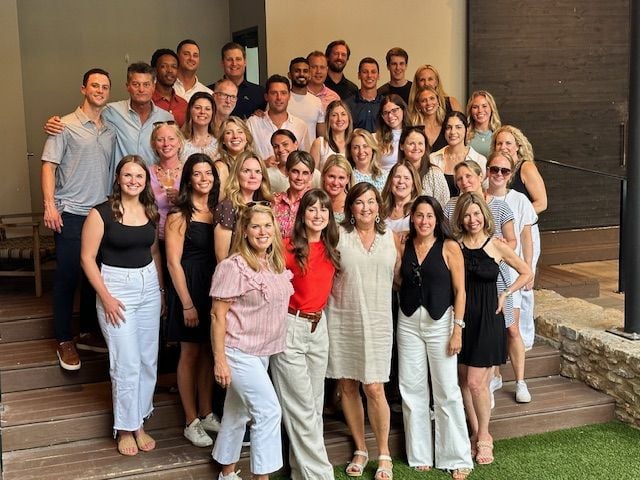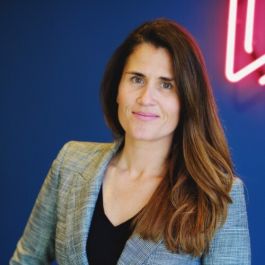“People buy from people.”
The sentiment is almost a truism in enterprise sales, but for Jon Clifford, a strategic account executive at Quantum Metric, the meaning is crucial to delivering on deals: Relationship management matters.
Building a career in enterprise sales is both challenging and rewarding, as it involves managing high-stakes deals with large corporations, often navigating complex buying processes and building strong, lasting relationships with clients.
According to a study from the Dale Carnegie Institute, 73 percent of people cite “trust” as central to the decision-making process — with 71 percent prioritizing a sale from a trusted sales rep over the lowest price.
To cultivate such trust, sales professionals must focus on what’s often referred to as “consultative selling” — where the salesperson acts as an advisor offering solutions, not just a vendor. This approach involves understanding a client’s challenges and proactively offering insights and solutions that align with their goals.
Research from McKinsey shows that top-performing sales reps are more than twice as likely as their peers to use a consultative approach that requires listening skills, empathy and expertise. Salespeople who position themselves as consultants rather than merely selling products or services build stronger, more resilient relationships.
“Great enterprise reps become students of their customers’ businesses — they understand their operations, strategic initiatives and competitive landscape,” explained Erick Alvarez, vice president of strategic accounts and international at LogicGate. “With this knowledge, the rep can empower their buyers with a game plan that will help them influence internal decision-making and develop a solid business case and project plan.”
Building a career in enterprise sales is as much about personal growth as it is about mastering sales tactics. Those who thrive in this field often balance persistence with flexibility, recognize the importance of genuine relationship-building and continuously seek ways to add value for their clients.
Built In heard from 11 top-performing enterprise reps about how they built their careers and what keeps them motivated and moving forward.
Featured Companies
Atlassian offers software solutions designed to simplify collaboration across teams, such as software development and IT operations. Its products include work management tools Jira and Trello, Statuspage for enabling real-time incident communications and the code management tool Bitbucket.
Tell us about your journey into enterprise sales.
I started my career selling financial software to institutional investors and was drawn to Atlassian by the opportunity to help the world’s most important companies solve their biggest problems by making their teams more productive and collaborative. I’m energized by the scale and impact of working with enterprise customers who are using Atlassian’s solutions to send people to space, address global health crises and deliver millions of pizzas each year. I’ve had the opportunity to participate in many meetings with C-suite leaders from companies in the Fortune 500 alongside our Atlassian executives. It’s exciting to bring influential thought leaders together and to be part of conversations that shape the course of our customers’ businesses.
“It’s exciting to bring influential thought leaders together and to be part of conversations that shape the course of our customers’ businesses.”
What is the most challenging aspect of enterprise sales? What about the most rewarding part?
Enterprise sales cycles can be many months to years long. In that time, we often see changes in client stakeholders, macroeconomic conditions, solutions and even internal account team changes. All of these factors add layers of complexity to an already intricate engagement, and require adaptability and strong organizational skills on the part of the account executive.
I’ve found that the best way to navigate these complexities is to identify our customers’ priorities at multiple levels in the account and to constantly confirm that we’re aligned to their goals as time and the deal progress. It also requires a strong team to support you because it’s impossible alone and everything we do at Atlassian is centered around teamwork.
Winning deals is fun, but what’s even more rewarding is reaching the end of a long sales cycle and seeing all of your team’s hard work result in an awesome outcome for the customer. At Atlassian, I’ve had the opportunity to work with accounts like Reddit, United Airlines and Splunk, who have gone on to present at our annual user conference to share how they’ve unleashed the potential of their teams with Atlassian.
What is the most important lesson you’ve learned from your time working in enterprise sales?
You have to go slow to go fast. Selling to large enterprises takes careful research, planning and coordination of your internal and external resources. It’s often tempting to jump right into an account or opportunity when your customer is excited and engaged. While I’m a firm believer in matching your customer’s urgency, I also know that having the curiosity to properly qualify an opportunity and identify the correct stakeholders will lead to the best end result. As a sales leader, it’s my job to encourage my team to gain a clear understanding of why the customer should invest in our solution and position Atlassian as a strategic partner who will provide long-lasting, value-driven solutions to their challenges.
Motive provides fleet management and logistics software solutions powered by AI to enhance efficiency, safety and compliance for transportation and logistics businesses.
Tell us about your journey into enterprise sales.
My journey into enterprise sales has been a whirlwind of things — challenging but ultimately rewarding, fun and exciting. I started my career in sales focusing on midmarket clients, where I developed a solid foundation in understanding this industry’s needs. However, I’ve always had a passion for working with larger organizations, drawn to their greater complexity and the scale of impact our solutions can have on their operations.
When the opportunity arose to transition to enterprise sales this January, I was beyond excited to take on the challenge. I was motivated by the prospect of engaging with more strategic accounts, navigating intricate decision-making processes and developing long-term partnerships that drive significant value. One of my most memorable experiences so far, outside of closing my first enterprise deal, was getting to meet with our entire team earlier in the year. Working in a remote environment, we’re grateful to have an opportunity to get together in person and meet with such an awesome group of really high-performing sellers. It was especially impactful to hear more about everyone’s book of business — sharing losses, wins and learnings.
What is the most challenging aspect of enterprise sales? What about the most rewarding part?
One of the most challenging aspects of enterprise sales is navigating the complex decision-making processes within large organizations, as they involve multiple stakeholders with varying priorities, concerns and timelines.
Separate from the decisions themselves, another important area is ensuring that we fully understand these complex issues our customers are solving. Our customers are doing very important, hard jobs, and it’s important to take the time to understand how Motive can mold into their business. Overcoming this includes building strong relationships with key stakeholders early on — identifying who the decision-makers are and understanding their individual needs and concerns. I especially take the time to meet with the potential day-to-day users of our platform. They’re deep in the weeds of it all — feeling the burden that might come from their many current different solutions which helps me understand their pain.
The most rewarding part of enterprise sales is seeing the positive impact our solution has on our customers’ operations. We are making an impact — reducing accidents and helping to make our customers more productive and more profitable.
“The most rewarding part of enterprise sales is seeing the positive impact our solution has on our customers’ operations.”
What is the most important lesson you’ve learned from your time working in enterprise sales?
The most important lesson I’ve learned is that without a champion you cannot have a real opportunity to win. Your champion needs to be the one advocating for you when you’re not in the room, they need to be the one who fully believes in the value your solution delivers and they need to trust you. Building trust and establishing credibility comes from listening and being human. I’d say that’s the best advice I can give to a sales rep looking to make a leap from SMB or midmarket — take the time to build those relationships, build trust and have the mindset that we’re here for the long game.
Grammarly is an AI-powered writing assistant that helps users improve grammar, clarity and tone in their writing across various platforms, from emails to social media and professional documents.
Tell us about your journey into enterprise sales.
My journey into enterprise sales began with small and medium-sized business clients, where I learned the importance of managing the entire sales cycle, from prospecting to closing. Success in SMB hinged on consistency; tracking daily activities and win rates was crucial for building a sufficient pipeline to meet quotas. My discipline in monitoring calls, meetings and proposals daily helped me consistently hit quota and laid the groundwork for future roles.
After proving myself in SMB, I was promoted to midmarket sales, where I learned that customers don’t just buy products — they invest in solutions to solve critical problems. I focused on identifying and quantifying core pain points and shifting discussions from product features to strategic outcomes. During this time, I also honed more complex sales methodologies, such as Challenger and SPIN selling, enhancing my ability to manage sophisticated buying processes.
The opportunity to take this approach to a higher level drew me to enterprise sales. I fell in love with the idea that I could apply an athlete’s mindset, constantly refining my skills and knowledge to excel in any situation, mirroring how professional athletes train for their sports. I wanted to be prepared for any scenario, just like an athlete who trains for every possible outcome in a game.
“Customers don’t just buy products — they invest in solutions to solve critical problems.”
What is the most challenging aspect of enterprise sales? What about the most rewarding part?
Navigating the organizational maze is undoubtedly the most exhilarating challenge in enterprise sales. Success involves understanding decision-making processes, aligning stakeholders and meeting their specific needs.
While getting caught up in closing deals is easy, I’ve learned that long-term success hinges on a different approach. Companies buy to achieve business outcomes that ensure success and future scalability. The challenge is connecting your services to the unique outcomes that each organization is trying to achieve.
The most rewarding part of enterprise sales is the ability to create a lasting, meaningful impact. For me, that combination of driving real change for customers and witnessing team success makes enterprise sales so rewarding. When you close a deal, it’s not just about hitting a number; you’re helping to transform how a business operates, often at a massive scale. Building deep, strategic partnerships where you’re seen as a trusted advisor, not just a vendor, is incredibly fulfilling. It’s also about witnessing the ripple effect within your team — seeing people grow, elevate their game and deliver big results.
What is the most important lesson you’ve learned from your time working in enterprise sales?
Developing a sales mindset of prioritizing customer needs over mere target achievement is truly transformative. This strategy, centered on solving their challenges, builds long-term customer loyalty and ardent supporters, often generating even more business. By prioritizing their needs, you’ll discover that you surpass your targets in unforeseen and remarkable ways.
Upon embarking on my journey into enterprise sales, a mentor imparted invaluable advice: shifting my mindset toward patience and strategy. While hard work can set you apart in SMB and midmarket, success in enterprise sales requires a more strategic approach, understanding various stakeholders’ priorities and building trust across the organization. It also involves focusing on consultative selling, where your solution is integral to their strategic goals. This way, you become a trusted partner, gaining the credibility needed to close complex deals and maintain lasting relationships.

PatientPoint is a healthcare engagement platform focused on improving patient experiences, offering digital tools and educational resources at points of care to enhance communication between patients and providers.
Tell us about your journey into enterprise sales.
My journey with PatientPoint began in 2018 as a relationship manager, where I supported our physician offices by enhancing patient engagement and education. This role sparked my interest in sales, leading me to transition to the client solutions team as a client success manager. In this position, I gained invaluable exposure to the sales world, collaborating closely with our enterprise sales teammates to drive impactful solutions for healthcare providers.
I thrive in high-stakes, fast-paced environments, and the energy of enterprise sales truly invigorates me. As a people person, I love connecting with others, learning about their backgrounds and stories and building strong relationships. This personal touch is what makes enterprise sales at PatientPoint so fulfilling for me.
What is the most challenging aspect of enterprise sales? What about the most rewarding part?
One of the biggest challenges in enterprise sales is gaining traction within large corporations, especially given the complexity of their needs. At PatientPoint, we tackle this challenge by leveraging our innovative solutions that enhance patient experiences and drive better outcomes. The sales cycle can be lengthy, but I stay committed to my outreach plan and look for relevant, relatable ways to engage my audience.
The most rewarding part? Securing that ‘yes’ from a client! It’s incredibly invigorating to see our hard work pay off, especially when we have the opportunity to showcase how PatientPoint’s unique offerings can transform patient engagement in their practices.
“The sales cycle can be lengthy, but I stay committed to my outreach plan and look for relevant, relatable ways to engage my audience.”
What is the most important lesson you’ve learned from your time working in enterprise sales?
Be thorough! Always triple-check client-facing materials before sending them out. In enterprise sales, especially at PatientPoint, clarity and professionalism are crucial in conveying our value proposition. People are drawn to authenticity, so embrace your personal brand and let your true self shine through.
Trust the process; the enterprise sales cycle can be long, but putting in the effort will yield great results. Stay dedicated, lean on your team for support and remember that building lasting relationships with clients is key to success.
VelocityEHS is an environmental, health and safety software company that helps businesses improve workplace safety and sustainability by managing EHS compliance, risk and environmental data.
Tell us about your journey into enterprise sales.
When I started in sales, I was essentially a business development representative, with little to no exposure or understanding of enterprise sales or career pathing. Transitioning into an account executive role in midmarket, I found myself drawn more to strategic work despite the more transactional or volume sale. When a role on our enterprise team opened up, I had an amazing director, who is still a fantastic mentor of mine and who showed me how much more I could get from my skill set with strategic, complex sales.
Selling to enterprise customers is a different ball game. Enterprise, especially global, is like doing a puzzle, and it’s really fun to put together. I started realizing what a big impact these projects can have on larger organizations — it’s not just about solving the business problem of the department you’re selling into, but the ripple effect it has on other areas. Once you realize that, you think about your work differently.
While my most memorable experience could be closing my biggest deals, it’s actually been every chance to have in-person meetings with my customers. It’s given me a front-row seat to see how they shape the vision and plans for their department and business.
What is the most challenging aspect of enterprise sales? What about the most rewarding part?
I always glamorized enterprise sales before I got there. But enterprise sales can be insanely challenging, especially from a mindset, confidence and a consistency standpoint. These projects can be a year long, if not multiple years long.
My first year, I made less money than I’d ever made in my career and my confidence was shattered. I was used to feeling validated by deals closing, that I knew what I was doing, but enterprise is just different. My manager will sell me out so we won’t pretend — I’ve never totally overcome that self-doubt and frustration when I’m in those “building” or “deal progression” phases. The more I’ve leaned into my own development, committing to my strategy, the confidence in my mindset and that I know what I’m doing helps get me through those tough months or years.
I make it sound scary, but it’s fun and exciting, too. The most rewarding part isn’t even about closing deals, but moments when I doubt myself yet still have the clarity that this is exactly what I’m meant to do. We can get so hyperfocused on the next thing or a promotion sometimes that the level of alignment and clarity with my purpose and skill set is the calm in the storm.
“The most rewarding part isn’t even about closing deals, but moments when I doubt myself yet still have the clarity that this is exactly what I’m meant to do.”
What is the most important lesson you’ve learned from your time working in enterprise sales?
It sounds obvious, but what worked for me in midmarket didn’t work for me in enterprise — and that’s still constantly changing. Enterprise customers are being targeted and sold to by everyone, so you really have to lean into the intangibles to be a differentiator.
Committing to the enterprise sale — the hunt of the “megadeal,” as some enterprise sales influencers call it — requires exactly that: commitment. Eliminate the noise and stop chasing down any and every deal. Enterprise sales requires an army — don’t try to be a hero. Learning how to team sell, know your role, manage internal resources and when to step back and be the conductor is vital.
Enterprise sales isn’t just your next step in a career path. You have to really be excited by the strategic complex sale. Some people may not ever be interested in that — that’s OK. There’s plenty of other ways to progress in sales that aren’t enterprise sales. Be prepared to be humbled. You likely were one of the best in SMB or midmarket. You’re going to have to unlearn what worked then and figure out how to sell into enterprise. Build a whole new skill set.
Tufin is a cybersecurity company providing solutions for managing network security policies and simplifying security operations, helping organizations maintain visibility and control over their network environments.
Tell us about your journey into enterprise sales.
I started as a business development representative, which lasted a bit over a year prior to stepping into my current role as an account executive. What made me want to sell to customers really started in my BDR days. As I did cold outreach and set up meetings for reps, I was always eager to feel the control and satisfaction of discovering an opportunity and working it from beginning to close.
A memorable experience of mine that stands out has to be my first closed deal. I was brand new to the entire process, so learning the sales cycle from beginning to end and resulting in a successful outcome was a very rewarding feeling.
What is the most challenging aspect of enterprise sales? What about the most rewarding part?
The most challenging aspect of enterprise sales in my experiences so far would be adjusting to every company, because every company and their purchasing and evaluation process is different. The way I have overcome this challenge is getting ahead of it early, asking the customer if they are willing to be transparent in what their process looks like from start to finish. The most rewarding part is when you successfully identify the process and meet the expected timeline of the deal closing.
“Every company and their purchasing and evaluation process is different. The way I overcome this is by asking the customer if they are willing to be transparent in what their process looks like.”
What is the most important lesson you’ve learned from your time working in enterprise sales?
The most important lesson I have learned while working in enterprise sales is that you cannot control everything. Even if you cross all your Ts and dot all your Is sometimes the outcome may be different than expected, this is out of your control sometimes. The advice I would give to a new sales rep is to ask questions — even if you think they may be dumb, there is no dumb question! Also, be a sponge, absorb everything from your peers regardless of tenure or success.
Quantum Metric is a digital analytics platform designed to help organizations understand and optimize customer experiences in real time, enhancing digital product performance and engagement.
Tell us about your journey into enterprise sales.
One of the most rewarding aspects of transitioning to enterprise sales is the depth of relationships you cultivate — relationships that often span your entire career. While selling to the midmarket also allows for meaningful connections, the nature of enterprise relationships tends to be more profound and strategic. I began my career in the midmarket, where I appreciated the faster pace and shorter sales cycles that helped create a productive and fun rhythm. However, in the enterprise space, the extended sales cycles foster a deeper level of engagement and trust, allowing for more impactful and lasting partnerships.
What is the most challenging aspect of enterprise sales? What about the most rewarding part?
One of the biggest challenges in enterprise sales is managing the vast number of stakeholders involved in each deal. While midmarket opportunities may have a handful of decision-makers, enterprise deals can involve 25 or more individuals, each playing a role in the process. To navigate this complexity, it’s crucial to approach every conversation with curiosity, treating each person as a potential key decision-maker. Staying meticulously organized and taking detailed notes are essential for keeping track of these interactions. The most rewarding moment comes after months, or even years, of building a business case and engaging with numerous stakeholders — when you’re ultimately chosen as the partner of choice.
What is the most important lesson you’ve learned from your time working in enterprise sales?
Always keep the focus on the customer. While your solution is cool or groundbreaking, what customers want is a partner to help them solve their business challenges. Your solution is a way for them to do that. It’s cliche but, people buy from people. Being dependable and forthright is key to earning the trust of a buying committee. Also, show up overly prepared and be patient.
“People buy from people.”
BlueConic is a customer data platform that helps organizations unify and activate customer data, empowering marketers to deliver personalized and data-driven customer experiences.
Tell us about your journey into enterprise sales.
I started as a business development representative for a systems integrator and then advanced to an account executive role within the same company. This experience gave me an appreciation for the intricacies of technology and the value of delivering tailored solutions to clients.
In my current role, I have been able to deliver innovative, data-driven solutions and engage in strategic conversations with large enterprises while delivering fun, engaging experiences that connect them with their consumers. What excites me about selling to enterprises is the scale of impact that I bring to the table in terms of digital transformation for some of the biggest brands globally.
One of my favorite experiences was closing a record-breaking deal with a major CPG brand, the largest net new deal in my company’s history. This nine-month journey involved navigating a complex web of stakeholders across various brand teams and retail partners. I had to continuously multithread, secure buy-in from decision-makers and cultivate a champion who passionately advocated for our strategy internally. The highlight of this experience was directly contributing to this organization’s digital transformation strategy.
What is the most challenging aspect of enterprise sales? What about the most rewarding part?
The toughest part of enterprise sales is getting everyone on the same page. Often, you’re dealing with multiple stakeholders across different teams, each with their own priorities and concerns. It’s not just about selling a solution; it’s about aligning a lot of different perspectives and making sure everyone sees how this solution is going to benefit them. This adds complexity, especially when you’re trying to balance everyone’s expectations. To overcome this, I put a lot of effort into understanding each stakeholder’s role and what they care about most. How is it going to affect what is important to them and how can I bring that value to the table for them?
“Enterprise sales is not just about selling a solution; it’s about aligning a lot of different perspectives and making sure everyone sees how this solution is going to benefit them.”
I make sure to build strong relationships early on and continuously run discovery in my conversations, as well as building internal champions who can help push the project forward from within. Enterprise sales challenges me to stay curious, think strategically and build relationships with those that I get to collaborate with. In my opinion, building out those relationships and seeing the impact of the strategies that you co-author with those champions is one of the most fulfilling parts of the role.
What is the most important lesson you’ve learned from your time working in enterprise sales?
One of the most important lessons I’ve learned in enterprise sales is that the discovery phase never really ends. New contacts often come into play throughout the sales cycle. As a result, you can’t rely on the initial discovery alone. You have to continuously check in, reassess priorities and ensure you’re aligning with what’s important to everyone involved. Always stay curious, keep asking questions and be adaptable.
For a rep looking to make the leap to enterprise, my advice would be to embrace this dynamic. In enterprise sales, it’s less about conversation to the single stakeholder or team and more about building long-term relationships with multiple contacts. You need to be prepared to manage complex, multi-threaded deals and constantly adjust your strategy as new decision-makers come into the picture. Stay focused on delivering value at every stage and make sure you’re addressing the evolving goals of everyone at the table.
Fluent is a performance marketing company specializing in customer acquisition, utilizing data-driven marketing campaigns to help brands connect with targeted audiences.
Tell us about your journey into enterprise sales.
Having partnered with enterprise brands for over 23 years, I’ve come to appreciate that no two deals are ever the same. What excites me most is getting to the heart of the customer’s business challenges and finding ways to help them overcome obstacles, drive growth and make a real profitable impact. While the longer sales cycles of enterprise deals can be demanding, securing larger-scale contracts is what fuels my passion.
A recent highlight from Q3 was securing a major retail brand in the lifestyle and consumer goods sector. I played a key role in helping them implement Fluent’s post-purchase advertising solution, which was incredibly rewarding. Our solution not only aligned with their business goals but also helped them launch a retail media strategy just in time for their busiest season — Q4. Just a few weeks in, the retailer is already thrilled with the significant boost in net profit we’ve contributed to their bottom line.
What is the most challenging aspect of enterprise sales? What about the most rewarding part?
The most challenging aspect of enterprise sales is the complexity of decision-making. In these deals, there are numerous stakeholders involved, often with differing priorities. It requires patience, strategic thinking and strong relationship building to align everyone toward a common goal. To overcome this, I focus on continuous communication, understanding the pain points of each stakeholder and positioning our solution as a tailored fit. The most rewarding part is the impact we can make — when you close an enterprise deal, you’re not just providing a solution, you’re helping to transform a company’s revenue growth trajectory.
“It requires patience, strategic thinking and strong relationship building to align everyone toward a common goal.”
What is the most important lesson you’ve learned from your time working in enterprise sales?
The most important lesson I’ve learned in enterprise sales is that it’s a marathon, not a sprint. Deals can take time, and persistence and strategic follow-up are absolutely essential. Success requires investing in long-term relationships and having the resilience to navigate setbacks along the way.
For sales reps transitioning from SMB or midmarket to enterprise, my advice would be to sharpen your ability to build trust and influence across various levels of an organization, especially with C-suite executives. Focusing on the C-suite is crucial because their buy-in often determines the success of a deal. Understanding the bigger picture and being able to articulate long-term value is what sets enterprise sales apart and is key to making that leap.
LogicGate is a governance, risk and compliance software provider that enables businesses to manage risk and automate regulatory compliance through a configurable platform.
Tell us about your journey into enterprise sales. What made you want to sell to enterprise customers, and what has been a memorable experience so far?
I’ve been in sales for nearly 15 years, and it’s been an incredibly fun and rewarding journey with more peaks than valleys but plenty of both! To be honest, my first few years in sales were not the best, but I eventually found my groove and worked my way up from inside sales to a top-performing enterprise sales rep. I wanted to move up into enterprise accounts to prove to myself that I could sell larger and more complex deals. I also looked up to some of the top enterprise reps who at the time seemed like living legends.
It’s hard to pick just one memorable experience, but working with global companies has allowed me to travel around the country and even to Latin America and Europe for work. I’m super grateful for those experiences and the connections I’ve made along the way.
What is the most challenging aspect of enterprise sales? What about the most rewarding part?
Large companies tend to struggle with internal communication and prioritization. Everyone has ideas and pain points they would like to address, but in reality, only a few projects can be resourced and funded. Even approved initiatives fail 50 to 70 percent of the time at large companies.
Great enterprise reps become students of their customers’ businesses — they understand their operations, strategic initiatives and competitive landscape. With this knowledge, the rep can help empower their buyers with a game plan that will help them influence internal decision-making and develop a solid business case and project plan.
“Great enterprise reps become students of their customers’ businesses — they understand their operations, strategic initiatives and competitive landscape.”
The most rewarding part of enterprise sales is that long sales cycles often lead to you developing meaningful relationships with your contacts and your supporting teammates. By the end of a deal, it’s pretty normal to end up on a texting basis with your new customers. I’m still friends with some of my customers from 10 years ago!
What is the most important lesson you’ve learned from your time working in enterprise sales?
Early in my career, I thought I could get by solely on relationships. I figured if people liked me they would buy from me. Like they say, “people buy from people they like.” That may be true — and relationships are massively important in enterprise sales — but that’s not enough.
As I began to work in more complex sales cycles, I quickly realized that having rigor and process around my sales discovery and qualification was just as important. Without it, you won’t be able to proactively identify gaps in your deals and implement the right countermeasures.
So my advice would be to focus on both relationships and the sales process. Go spend time with your buyers in person and get to know their objectives and challenges, but don’t do it loosely. Follow a process or framework to keep you and your buyer honest on whether you have a deal that can or can’t be made.
Dscout is a user research platform that enables companies to gather qualitative insights from customers through remote, real-time studies and in-depth participant feedback.
Tell us about your journey into enterprise sales.
I started my career as most people do, as a sales development representative focused on high-volume outbound activity, moving upwards to selling to small and medium-sized business, then to midmarket orgs and now to enterprise.
I love the opportunity to speak and let my curiosity take the wheel with the large, familiar companies that I’m a consumer of and admire. Enterprise sales forces you to get outside your comfort zone to solve multiple, complex challenges at once in order to build a significant business case, build stronger relationships over a longer period of time and be more resourceful than ever before.
One of my most memorable experiences is from a recent deal I closed with a large retailer after almost three years of nurturing and relentlessly working the account. It resulted in the largest deal in Dscout’s history. It was an all-hands-on-deck approach from my amazing teammates in sales, product, customer experience, existing business, marketing and leadership. As an enterprise rep, you’ve got to be able to manage a lot on your own but you can’t succeed without great teams around you, and my internal resources proved invaluable.
“As an enterprise rep, you’ve got to be able to manage a lot on your own but you can’t succeed without great teams around you.”
What is the most challenging aspect of enterprise sales? What about the most rewarding part?
Navigating and breaking into an account is challenging in the way that an intricate puzzle is. It takes strategy with your SDR and marketing teams paired with a lot of patience. Sometimes it can take months or years just to get a meeting with someone from a key organization. Then once you get that meeting, you need to capitalize to try and get additional interest from other team members. So, add more months/years and dozens of meetings later for the sales cycle to materialize and close. Over communication and aligning on next steps after each conversation are key with your internal teams and with your prospects.
For me, the reward stems from the relationships and trust you build along the way. So much of your time and effort goes into a deal, and a lot of your days are spent talking to the same people (sometimes more often than you speak to your loved ones). So, to know all your hard work actually helped that person and their team — and ultimately an entire organization’s goals — is really gratifying. You never know either, people may go to a new company and reach out with a new opportunity due to their past experience with you.
What is the most important lesson you’ve learned from your time working in enterprise sales?
Patience in trusting your process. At the enterprise level, sales are no longer simple or transactional and “happy ears” won’t get you far. You need to find and build a champion but you have to continuously test their willingness to move this forward for you and prove they’re trying to accomplish the same end result in the agreed timeline. And while having a champion is necessary, you can’t hitch your wagon to one person, you need to continuously multi-thread in order to hedge your bet, create more buy-in and potentially grow the deal size.
You have to remember that you’re not selling to a team, you’re selling to an organization. If you follow the right process for it, the sky’s the limit.


























